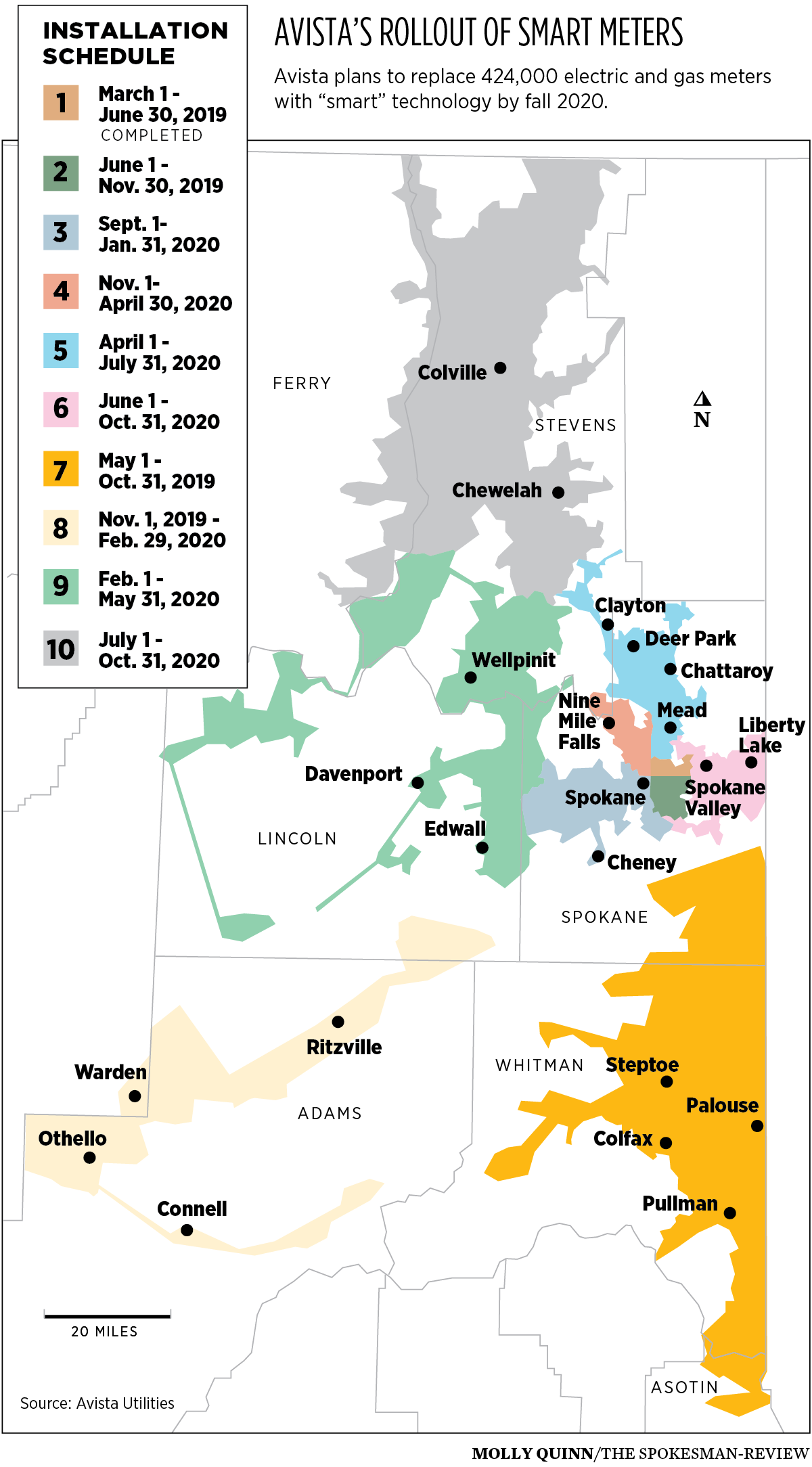Avista’s installation of new meters continues in Spokane

Goodbye, meter reader. Hello, smart meter.
Avista Corp. is continuing to install smart meters across its service area, with residents on Spokane’s South Hill the latest recipients of the advanced metering technology.
The energy company already has installed 100,000 smart electric meters and smart gas modules in Washington, marking a milestone toward the complete deployment of 424,000 meter and module upgrades anticipated to be complete in fall 2020.
“Everybody’s going to get a new meter,” said Josh DiLuciano, Avista’s director of electrical engineering. “We’re going to touch all of our customers.”
The benefits of smart meters are many, DiLuciano said, but the most direct is the responsiveness it will bring to the grid.
For most Avista customers right now, their home is on its own. If the power goes out, the homeowner has to call Avista, which will send a worker to assess and fix the problem. A smart meter, however, will notify Avista when the power’s out. The outage could be identified and remedied before the resident even knows.
During the 2015 windstorm, when gale-force winds disrupted electricity to 180,000 Avista customers, some people were without power for 10 days. DiLuciano said the utility could have restored power much sooner if the smart meters had been in place.
Beyond that, the meters will act something like a Fitbit for the home, tracking usage peaks and valleys. Using the near-realtime data supplied to customers through their online accounts, a savvy homeowner could alter electricity or gas usage depending on what they see. For instance, watching appliances sap daytime electricity while you’re at work may convince you to unplug some of the unnecessary machines and save on so-called “energy vampires.”
The $165 million project is moving quickly. Swapping out an old meter for a new smart one takes about two minutes, with some additional time spent while a technician examines the existing device for fire hazards. The meters are being installed by a contractor, Wellington Energy, a Pennsylvania-based company that has installed smart meters around the country over the past 15 years. The company has 40 technicians in the field and replaced about 1,600 meters per day in July.
Electric customers will experience a short outage. Gas customers will not. The technician will leave a flyer on the front door to let residents know when the installation is complete.
The new meters were designed and manufactured by Itron, the Liberty Lake-based company that has smart meters deployed on every continent but Antarctica.
About 60% of U.S. households have smart meters, according to the Edison Electric Institute, which estimates that 76 million have been deployed nationally. Though most American households now have smart meters, concerns about security, privacy and health continue to worry some.
Avista says customer privacy is safeguarded. Smart meters measure customers’ energy use and send the information to a network router installed on a nearby utility pole. The data is sent to Avista through a secure satellite or cellular signal. The meters don’t store or transmit personal customer information, such as names or addresses. Encrypted information about energy use is sent through low-power-frequency radio waves to Avista. The utility matches the data about energy use with customer information.
The information is transmitted three times daily, which puts the radio frequency exposure from smart meters at a fraction of other household devices, such as cellphones and microwaves, according to Avista.
As for health concerns, Avista refers to research done by the Electric Power Research Institute, which shows that smart meters emit far less dense radio waves than a television, microwave or cellphone.
Even so, Avista customers can “opt out” of receiving a smart meter by paying a $75 upfront fee. Those customers will continue to pay $5 a month to have their meter read. The fees are set by the state. To date, fewer than than 1,000 customers have opted out, which equates to about 1% of people who have received smart meters.
Before the update to technology, Avista employed 47 people who read meters. Avista said 27 of those people have either found new positions or retired.